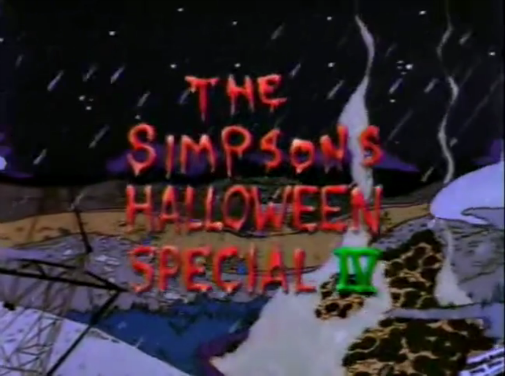How to trick the Devil

Tree House of Horror Episode: IV
[link to Season 5 Episode 5] (http://projectwatchseries.com/videos/-the-simpsons-s5%20-e5/137504.h)
In almost all Biblical scriptures in relation to the Devil, the Devil has been described more or less as the deceiver or the ultimate trickster. Everyone seems to mutually agree that messing with the Devil will lead you to no good. Few have ever actually dance with the devil and came back to the tell story. However, in The Simpsons, Homer spends most of his time dodging, evading, and ultimately winning against the Devil--through Bureaucracy. This story came as an inspiration after reading Utopia of Rules by David Graeber, in it he describes how their is a lack of analytical/satirical research on Bureaucracy in comparison to stories like "The Castle" and "Catch-22" I would argue that for the Simpsons the bureaucracy exists; its a rough manifestation but it exists; and its ultimately a commentary of how such a system can bring down the Prince of Darkness.
@1:18 did anyone notice what was behind the image of the Devil ? Its a purple mountain, but look well at the silhouette--its Homer. Nice cameo.
The whole interaction with the Devil really emerges out of another contract Homer agreed upon at an earlier stage of his life. Look at @ 2:02 when he is scrambling to find a replacement donut to subside his crave. He opens an emergency manual, and in the middle of the book you see a cut-out, perfectly fit for one juicy donut. However, what Homer finds is a sad IOU.
He figures that his quench for this donut has the market value equal to that of his soul. He says it out loud "I would sell my soul for a donut" @2:10 Moments later, Ned Flanders appears as the devil--a funny juxtaposition--Flanders hands out another contract for the trade of 1 donut for 1 soul. Homer agrees right away. And before Flanders could finish speaking, Homer ate all but the last piece. In a condescending manner Homer states but what could be the best line in the episode @ 2:58 "I am smarter than the Devil!, I am smarter than the Devil!"
For much of this time since when Homer initiated the contract with Ned Flanders, the leverage was always Ned's. The contract was always meant to be broken, given the fact of how stupid Homer is, and how in love he is with Donuts, eventually he was going to lose. However when he does, as seen in @ 3:30 the leverage gets turned back to the Simpsons. The moment Homer is about to get sucked into the inferno vortex. Lisa stops Ned, and says @ 3:48 "Doesn't my Dad have the right for a fair trail?" and Ned replies, "Oh you Americans with your due process, fair trails, this is always so much easier in Mexico"
The Devil's contract transgresses into a bureaucratic process and in the minutes that follow @5:00 to @8:00 the case seems hopeless and bleak for Homer. **@ 5:30 Lionel Hutz--Homer's attorney--clumsily offers the Devil the ability to chose the jury; which end up being a crowd of the baddest people in history. Ned's view of the contract is emphasized at @ 6:15 "I only ask what is rightfully mine." At this point you start to wonder if there is any escape for Homer? All evidence points to the accused. And at surface level, Lionel Hutz, seems to only dig Homer's grave deeper by this statement pointed out @6 :35 "What is a contract? Webster defines it as an agreement under the law which is unbreakable...unbreakable." While his statement is counter-intuitive and frankly a DUH moment, it helps transition the next scene in the episode. Because while the Jury and the Judge is about to make their final decision--Marge Simpson brings to the table what could be the best evidence and exemplifies what Hutz stated earlier: "A contract that could never be broken." @ 7:30 She shows everyone the original owner of Homer's soul. A letter Homer had written (frankly probably forgot as well) to March after the night of their wedding. It states, "Dear Marge, you have given me your hand in marriage, all I can give in return is my soul."
With this legal transcript available; the 2nd contract initiated with the Devil and Homer is forfeited. And Marge becomes the one who is outsmarts the Devil for remembering such paperwork existed in their case file. Obviously the only drawback to this story is the fact that the Devil did not know what Homer wrote beforehand. But what the battle really illuminates is that bureaucracies are ultimately a war on paperwork--which party can bring the best kind to best fit your case. Bureaucracies are the one mechanism that will make the Prince of all Darkness feel stupid. But I guess that is what it is meant to do. Right? Make everyone feel stupid.